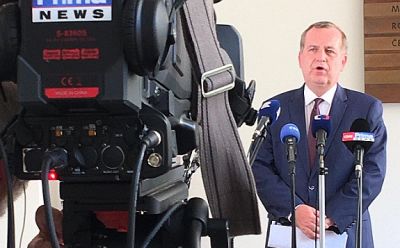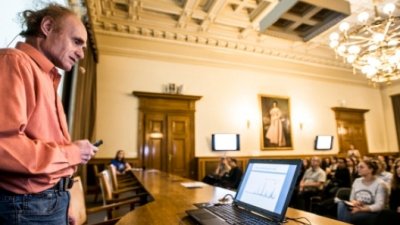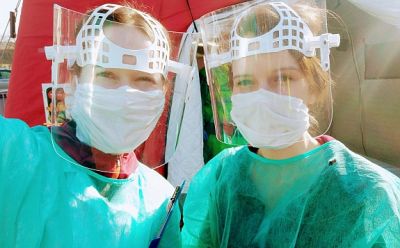Even though vaccination for Covid-19 has begun in the Czech Republic and a national plan for vaccination laid out over the coming months (with the first vaccines being from Pfizer/BioNtech and Moderna), there are still many people who remain sceptical and have expressed fear or doubts. Online there are people from all walks of life who are uneasy that vaccines were developed remarkably quickly, who question whether they are safe or whether they will even stem the continuing crisis. Anyone among the broader public wanting to view a serious debate on the matter should look up a discussion that went live this week organised by the Neuron Endowment Fund.
Streamed debate brought together top scientists
Guests at the online roundtable discussion included top Czech scientists, from virologists to doctors to economists (including many from Charles University), looking at different aspects of the pandemic and how to best get through the difficult days and months ahead. As Neuron founder Monika Vondráková put it at the start of the debate, the aim was for viewers to “think critically” and “make up their own minds” based on presented facts.
The light at the end of the tunnel
 The roundtable discussion was chaired by CU’s Vice-Rector for Research Jan Konvalinka, who has been outspoken about the coronavirus threat.
The roundtable discussion was chaired by CU’s Vice-Rector for Research Jan Konvalinka, who has been outspoken about the coronavirus threat.
Konvalinka is well-known for combatting disinformation and has been vocal throughout the crisis. He began the discussion with grim numbers right at the outset, a marked jump in the mortality rate and average life expectancy numbers, but he also spoke of the light at the end of the tunnel: effective vaccines which are now available which can turn the tide and over time reel in the global crisis.
Prof. Julius Lukeš pointed out that vaccines have been with us 200 years and anti-vaccination groups for some 150. Particularly sobering was a video he cued showing how children suffered in the polio epidemic in the 1950s before Salk developed his vaccine: paralysed, many of them in iron lungs, unable to breathe on their own. The same video, by contrast, ended with images of absolute joy when the vaccine was found. This was the bedrock on which the discussion was based. An interesting aspect, Lukeš said, is that public opposition to vaccines was far less prominent in periods when people had recent experience with deadly and debilitating illness first-hand.
Paradoxically, the further away we have gotten from those – precisely thanks to vaccines – the stronger the anti-vax movement has become. Biologist Lukeš, a member of the Czech Academy of Sciences, was the first to speak, offering a primer on the history of vaccination, beginning with Edward Jenner, often referred to as the father of immunology. He discovered immunity to smallpox conferred by mild cowpox and his first vaccination in the 18th century; that was followed by a primer on Louis Pasteur for his rabies vaccine in the 19th century and Jonas Salk famous for his vaccine for polio in the 20th.
Novel vaccines against a novel coronavirus
That led to the main topic, the novel coronavirus SARS-CoV-2, which causes Covid-19. There, Prof. Lukeš explained in depth how scientists last year developed RNA-based vaccines (or messenger RNA vaccines) in record time. Normally it takes around 10 years to develop vaccines, but in the rush against Covid, many of the traditional testing stages beginning in the lab overlapped and production began even before vaccines were approved.
Because of the sheer number of patients tested in the final stage, these vaccines could be deemed – and proven – safe for human use far sooner than would traditionally been the case. The main takeaway? That the vaccines which have gotten approval were rigorously tested and met stringent standards despite the process having been sped up. The much larger number of those tested means that the development could be collapsed into the shorter time frame without sacrificing or cutting corners on safety. At the end of the day, most important is that the resulting vaccines have proven to be highly effective, with 95 percent success rates for at least two.
The immune system and more
Other guest speakers included Anna Šedivá of the Department of Immunology, University Hospital Motol, Prague, who took viewers through the process of the human body’s immune system response, in this case to an entirely novel pathogen. It quickly became evident, the thrust of her presentation was explaining why getting vaccinated with a mRNA was not the same as getting the infection itself. In short, the immune system is alerted but does not need to react with the same intensity as against the actual virus, but learns how to recognise the threat. The combination of people who have already caught Covid and those who are being vaccinated, she said, would hopefully soon see the pandemic quelled. Along with Pfizer/BioNtech and Moderna, the Czech Republic has also ordered vaccines from CureVac, AstraZeneca, and Johnson & Johnson.
Professor Václav Hořejší, a renowned molecular biologist, addressed the question of herd immunity and why allowing Covid-19 to spread unchecked and burn through the population, would be a mistake: first, he said, some 100,000 deaths would arise in a population of more than 10 million and second, there was no guarantee, he said, that immunity gained from having had Covid lasted long-term. This pathogen, Hořejší explained, was capable of fighting back and he also pointed out that the most serious cases were where the immune system responded poorly. Those are often cytokine storms.
As a viewer, it is not hard to imagine that the sheer number of serious or critical cases that would arise if Covid was allowed to run rampant that would hit the health care system hard, putting medical staff at greater and greater risk as well. Such conditions would force personnel to make triage decisions, in effect choosing between those most likely to survive and those worse off. Most remember hearing about the situation in New York in the first wave in the US last year and shudder.
There are sticking points of course when it comes to the new vaccines where the public wants answers: data on how long immunity from the new vaccines will last remains the biggest unknown. That, said Hořejší would only be uncovered over time and in real time. Similarly, it is not yet known whether vaccinated persons can still spread the virus. But he said that studies are currently underway that should provide answers soon.
Why so much fear of vaccines?
At this point, Prof. Jan Konvalinka turned the discussion to why there is so much (even growing) opposition to vaccines, addressing the highly-respected psychiatrist Cyril Höschl. According to Höschl, the “fog of information” now and in the past contributed to opposition, was fertile breeding ground for doubt and growing lack of trust, which is only amplified in times of crisis and stress. Without even getting into politics polarising issues or fake news further complicating matters. A mix of factors, worldwide, he suggested, was leading to growing mistrust. The answer? In his view scientists can only counter such doubts with consistent, valid, timely and transparent information.
 Other guest speakers in the programme discussed the Czech national strategy, which has now been passed by the government. Similar to elsewhere, those most at risk as well as health care workers, are among the first group. Much of the current plan was outlined by Petr Smejkal, the chief epidemiologist at the Institute of Clinical and Experimental Medicine. Also discussed was the speed of vaccination, worries about new British and South African strains, which could complicate matters in the coming months. Infectiologist Ladislav Machala expressed a degree of dismay that the rate of vaccination hadn’t been faster. This was a key point which many on the panel addressed. Variants on how the vaccine could be administered more quickly were without clear consensus.
Other guest speakers in the programme discussed the Czech national strategy, which has now been passed by the government. Similar to elsewhere, those most at risk as well as health care workers, are among the first group. Much of the current plan was outlined by Petr Smejkal, the chief epidemiologist at the Institute of Clinical and Experimental Medicine. Also discussed was the speed of vaccination, worries about new British and South African strains, which could complicate matters in the coming months. Infectiologist Ladislav Machala expressed a degree of dismay that the rate of vaccination hadn’t been faster. This was a key point which many on the panel addressed. Variants on how the vaccine could be administered more quickly were without clear consensus.
National strategy, speed of vaccination, economic questions
Lastly, the economic impact of vaccination was also discussed, by CERGE-EI economist Filip Matějka. The cost of vaccinating Czechs, at present he said, could be around 10 billion crowns. But three months later, the amount, in his view, would be 50 times higher. That takes into account the continuing economic damage leading from lockdowns and restrictions that have paralysed growth in key sectors, and also led to the loss of jobs, lowered salaries, less spending and so on.
The roundtable format, with some guests in the studio, others online, combined with a skilled and expert host who is himself a virologist, meant this was a discussion that was rich in detail and informative as it was multifaceted. Viewers/attendees in the comment section made clear it was both informative and a pleasure to watch, asking for more like it. It is hard to say, whether such discussion or debate will change minds of those staunchly opposed to vaccinations (some based on fringe conspiracy theories or for political reasons or both) but it should at the very least reassure those who want less media sensation and more honest debate.
In the end, the most haunting perhaps of the whole presentation was, again, the film clip from the polio epidemic in the US of the young lives ruined or lost before there was a vaccine. Showing how a vaccine, hope beyond hope, changed everything.
























